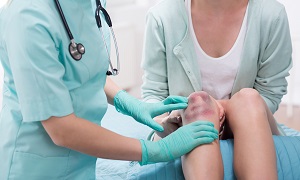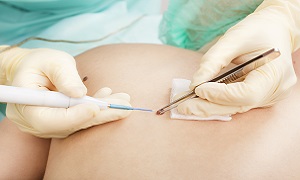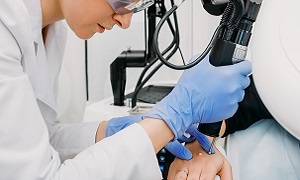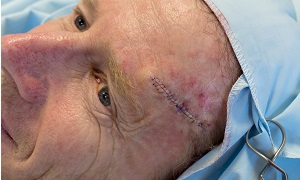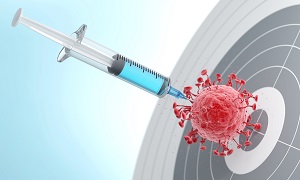Basal Cell Carcinoma
Basal cell carcinoma is a cancer which can grow on parts of the skin which get a lot of sun. It is the least risky type of skin cancer and it is unlikely to spread to other parts of your body and it can be cured easily if it caught early.
The tumors usually start off as small shiny bumps, usually on the nose or other parts of your face. But they might occur on any part of the body, including the arms and legs. If you are having fair skin, you are more likely to get this type of cancer.
This cancer also grows very slowly and often it doesn’t show up for several years after intense or long-term exposure to the UV rays of the sun. If you are exposed to the sun a lot or tanning beds, you can even get it a younger age.
Symptoms
Early signs of basal cell carcinoma can include a skin growth in a dome shape with blood vessels in it. It can be pink, black or brown. Initially it comes up like a small pearly bump, which resembles a flesh-colored mole or a pimple, which won’t go away. Sometimes these growths might look dark. Or you might also see shiny pink or red patches which might look a bit scaly.
Another symptom you can watch out for is waxy, hard skin growth.
Basal cell carcinomas are also known to be fragile and they bleed easily.
Causes
UV rays from the sun or from a tanning bed are usually known to be the main causes of basal cell carcinoma.
When your skin is hit by the sun’s UV rays, it might cause damage to the DNA in the skin cells. The DNA is holding the code for the way these cells are able to grow. Over time, damage to the DNA might cause cancer to form, though this process usually several years.
Diagnosis
Your doctor or a skin specialist (dermatologist) will need to conduct a medical history and exam. Your doctor will conduct a general physical exam and ask you regarding your medical history, changes in your skin or any such signs or symptoms that you might have experienced.
You might be asked when you first notice this kind of skin growth, is the growth or lesion painful, has anyone in your family had skin cancer previously, etc.
Skin Exam
Biopsy
Your doctor might also do a skin biopsy, which will involve removing a small sample of a lesion for laboratory testing. This will reveal whether you are having skin cancer and if so, the type of skin cancer. Thy type of skin biopsy that you will undergo will be depending on the type and size of the lesion.
Treatment
Cutting out the tumor
Your doctor might call this excision. In this procedure, he numbs the tumor along with the skin around it. Then he will scrape the tumor with a spoon-shaped device. After this, he will be cutting out the tumor with a spoon-shaped device. Then he will cut the tumor out as well as a small surrounding area of normal-appearing skin which will be sent to the lab.
If the lab results show there are cancer cells in the area around the tumor, some more of your skin might need removal.
Scraping the tumor away and using electricity for killing cancer cells
Your doctor might term this procedure as ‘curettage and desiccation’. First, your doctor will numb the skin and use a curette, a tool with a spoon-like shape to scrape off your tumor. Your doctor will control your bleeding and kills any other cancer cells using an electric needle.
Freezing your cancer cells
Radiation Treatment
Mohs surgery
Named after the doctor who invented it, in this procedure, the surgeon removes your tumor layer by layer. He takes out some tissue initially and looks at it under a microscope in order to see if it has any cancer cells before he moves on to the next layer.
If your tumor is larger, has been there for too long or in a sensitive body part, your doctor might recommend this surgery.
Creams and Pills
Your doctor might be suggesting some medicine, which can treat your basal cell carcinoma. The two creams which you put on your skin are:
- fluorouracil (5-FU)
- imiquimod
You will need to apply these creams for several weeks and you will need to be checked by your doctor as well, on a regular basis, so that he knows how well they are working.
Targeted Drug Treatment
Although it is rare, basal cell carcinoma might spread to nearby lymph nodes and other areas in the body. In this situation, your doctor might recommend Targeted drug treatment
Targeted drug treatments focus on specific weaknesses that are present within the cancer cells. By blocking these weaknesses, targeted drug treatments can cause the death of the cancer cells.
Targeted treatment drugs for basal cell carcinoma can block molecular signals which enable cancer to continue growing. They are usually considered after or when other treatments aren’t possible.
Chemo
Although it is rare, basal cell carcinoma might spread to nearby lymph nodes and other areas in the body. In this situation, your doctor might recommend Chemo.
Chemo makes the use of powerful drugs to kill cancer cells. When other treatments haven’t helped, this option might be considered.
Risk Factors
Chronic exposure to the sun, having fair skin, radiation, increasing age, having a family history of skin cancer or immune-suppressing drugs are some of the reasons that can increase the risks of developing skin cancer.
Prevention
There are several steps one can take to prevent basal cell carcinoma:
- Avoiding the sun during the middle of the day, i.e. between 10 am and 4 am is very important and
- One should also consider wearing sunscreen and protective clothing when they need to go out.
- Tanning beds need to be avoided.
Check your skin regularly as well, and if you see any significant changes, you need to report it to your doctor.

